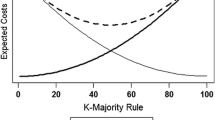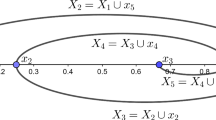Abstract
This paper analyzes how to choose a delegation, a committee to represent a society such as in a peace conference. We propose normative conditions and seek Pareto optimal, consistent, neutral, and non-manipulable ways to choose a delegation. We show that a class of threshold rules is characterized by these criteria. The rules do not choose a fixed number of delegates, but instead require different sizes of delegations, depending on the heterogeneity in society. Therefore the resulting delegations are very inclusive, and with t delegates the ratio of individuals whose opinions are not included is always below  . For instance, a delegation of size two should have at least 75% support from the society and therefore only less than 25% of the opinion pool can be neglected.
. For instance, a delegation of size two should have at least 75% support from the society and therefore only less than 25% of the opinion pool can be neglected.
Article PDF
Similar content being viewed by others
Avoid common mistakes on your manuscript.
References
Aaberge, R.: Characterizations of Lorenz curves and income distributions. Soc. Choice Welf. 17(4), 639–653 (2000)
Athanasoglou, S.: Strategyproof and efficient preference aggregation with Kemeny-based criteria. Games Econ. Behav. 95, 156–167 (2016)
Barberà, S.: Strategyproof social choice. In: Arrow, K.J., Sen, A., Suzumura, K. (eds.) Handbook of Social Choice and Welfare, Volume 2 of Handbook of Social Choice and Welfare, Chapter 25, pp. 731–831. Elsevier, Amsterdam (2011)
Barberà, S., Dutta, B., Sen, A.: Strategy-proof social choice correspondences. J. Econ. Theory 101(2), 374–394 (2001)
Bossert, W., Sprumont, Y.: Strategy-proof preference aggregation: possibilities and characterizations. Games Econ. Behav. 85(1), 109–126 (2014)
Bossert, W., Storcken, T.: Strategy-proofness of social welfare functions: the use of the Kemeny distance between preference orderings. Soc. Choice Welf. 9(4), 345–360 (1992)
Can, B., Storcken, T.: A re-characterization of the kemeny distance. J. Math. Econ. 79, 112–116 (2018)
Damerau, F.: A technique for computer detection and correction of spelling errors. Commun. ACM 7(3), 171–176 (1964)
Dasgupta, P., Maskin, E.: On the robustness of majority rule. J. Eur. Econ. Assoc. 6(5), 949–973 (2008)
Davies, J., Hoy, M.: Making inequality comparisons when Lorenz curves intersect. Am. Econ. Rev. 980–986 (1995)
Dudouet, V., Lundström, S.: Post-war political settlements: from participatory transition processes to inclusive state-building and governance. Research report. Berghof Foundation, Berlin (2016)
Fishburn, P.C.: Condorcet social choice functions. SIAM J. Appl. Math. 33(3), 469–489 (1977)
Gibbard, A.: Manipulation of voting schemes: a general result. Econometrica 41(4), 587–601 (1973)
Grandmont, J.-M.: Intermediate preferences and the majority rule. Econometrica 46(2), 317–330 (1978)
Hamming, R.: Error detecting and error correcting codes. Bell Syst. Techn. J. 29(2), 147–160 (1950)
Kemeny, J.G.: Mathematics without numbers. Daedalus 88(4), 577–591 (1959)
Kendall, M.: A new measure of rank correlation. Biometrika 30(1/2), 81–93 (1938)
Lanz, D.: Who gets a seat at the table? A framework for understanding the dynamics of inclusion and exclusion in peace negotiations. Int. Negotiat. 16(2), 275–295 (2011)
Levenshtein, V.: Binary codes capable of correcting deletions, insertions, and reversals. Sov. Phys. Dokl. 10(8), 707–710 (1966). Original in Russian in Doklady Akademii Nauk SSSR, 163(4), 845-848, 1965
Mackenzie, A.: An axiomatic analysis of the papal conclave. Econ. Theory 69(3), 713–743 (2020). https://doi.org/10.1007/s00199-019-01180-0
Sato, S.: A sufficient condition for the equivalence of strategy-proofness and nonmanipulability by preferences adjacent to the sincere one. J. Econ. Theory 148(1), 259–278 (2013)
Satterthwaite, M.A.: Strategy-proofness and arrow’s conditions: existence and correspondence theorems for voting procedures and social welfare functions. J. Econ. Theory 10(2), 187–217 (1975)
Smith, J.H.: Aggregation of preferences with variable electorate. Econometrica 41(6), 1027–1042 (1973)
Suzumura, K., Xu, Y.: Characterizations of consequentialism and nonconsequentialism. J. Econ. Theory 101(2), 423–436 (2001)
Young, H.P.: An axiomatization of Borda’s rule. J. Econ. Theory 9(1), 43–52 (1974)
Young, H.P.: Social choice scoring functions. SIAM J. Appl. Math. 28(4), 824–838 (1975)
Author information
Authors and Affiliations
Corresponding author
Additional information
Publisher's Note
Springer Nature remains neutral with regard to jurisdictional claims in published maps and institutional affiliations.
Burak Can: This work is mostly financed by the Netherlands Organisation for Scientific Research (NWO) under the Grant with Project No. 451-13-017 (VENI, 2014) and partially by Fonds National de la Recherche Luxembourg. The support of both institutes, therefore, is gratefully acknowledged.
Péter Csóka was supported by the ÚNKP-16-4-III New National Excellence Program of the Ministry of Human Capacities and by the Nemzeti Kutatási Fejlesztési és Innovációs Hivatal - NKFIH, K-120035.
Rights and permissions
Open Access This article is licensed under a Creative Commons Attribution 4.0 International License, which permits use, sharing, adaptation, distribution and reproduction in any medium or format, as long as you give appropriate credit to the original author(s) and the source, provide a link to the Creative Commons licence, and indicate if changes were made. The images or other third party material in this article are included in the article’s Creative Commons licence, unless indicated otherwise in a credit line to the material. If material is not included in the article’s Creative Commons licence and your intended use is not permitted by statutory regulation or exceeds the permitted use, you will need to obtain permission directly from the copyright holder. To view a copy of this licence, visit http://creativecommons.org/licenses/by/4.0/.
About this article
Cite this article
Can, B., Csóka, P. & Ergin, E. How to choose a fair delegation?. Econ Theory 72, 1339–1373 (2021). https://doi.org/10.1007/s00199-020-01312-x
Received:
Accepted:
Published:
Issue Date:
DOI: https://doi.org/10.1007/s00199-020-01312-x




